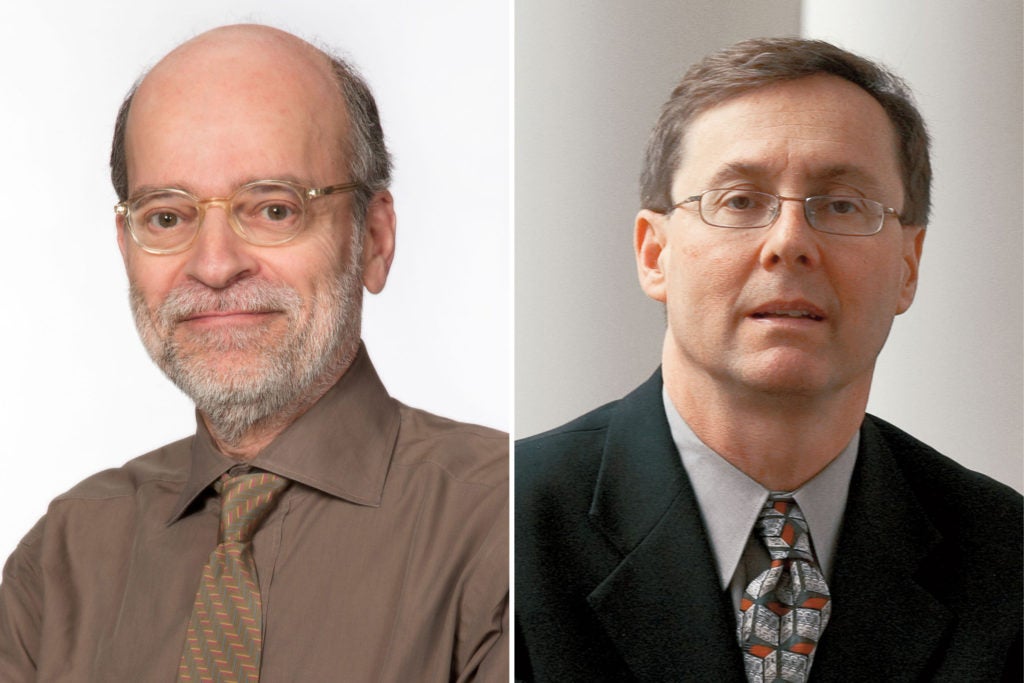People
Lucian Bebchuk
-
Imagine a world where CEOs get paid $3 million a year
April 27, 2023
Okay, that may not be as dramatic as imagining world peace, but hey, I’m an economist. And, as I will argue, more reasonably paid CEOs…
-
Israel’s Political Crisis Will Harm the Economy — In Time
March 28, 2023
Karnit Flug was the governor of the Bank of Israel, the nation’s central bank, from 2013 to 2018. “One of my biggest challenges was the…
-
Harvard Law School faculty members are currently featured prominently on SSRN’s list of the 100 most-cited law school faculty in all fields.
-
How the Start-Up Nation Could Fail
March 16, 2023
An article co-written by Lucian Bebchuk: Israel’s ruling coalition is now pushing through its parliament an array of major legal changes that would greatly curtail…
-
Activist investors smell money. Can retail investors profit by following them? It’s tempting to try now that activist hedge funds are baying at target companies…
-
Top Int’l Economists to Netanyahu: ‘Undermining Judiciary Detrimental to Prosperity and Growth’
February 9, 2023
Fifty-six world-renowned economists, including 11 Nobel laureates, have signed an open letter protesting the Benjamin Netanyahu-led government’s plan to weaken Israel’s democracy and damage judicial…
-
US law academics oppose judicial overhaul in Israel
January 31, 2023
More than 70 professors of law at universities in the US have signed a statement opposing the changes to Israel’s judicial system being promoted by…
-
CEOs Who Are All Talk and No Action on Inclusion Still Benefit
January 25, 2023
Corporate leaders who talk the most about diversity may benefit from greater investment in their companies by socially conscious funds, even if hiring and promotion…
-
Trouble on Board: DEI Promises Abound but How Prepared Are Companies to Meet Those Goals?
September 27, 2022
Two acronyms — DEI and ESG — have become ubiquitous in American corporate-speak over the last few years. Many believe the movements toward bringing diversity,…
-
Articles by Harvard Law faculty and alumni among top ten corporate and securities articles of 2021
June 22, 2022
Articles by four Harvard Law faculty were selected in an annual poll of corporate and securities law professors as three of the ten best corporate and securities articles of 2021.
-
Twitter is “the digital town square, where matters vital to the future of humanity are debated,” a triumphant Elon Musk proclaimed in announcing his deal to buy the social media platform. In other words, Twitter is no ordinary corporation. It serves as something akin to a public utility, a unique global means of communication. ... “Corporate leaders and practitioners have been increasingly pledging to pay close attention to the interests of stakeholders, such as customers or society in the case of Twitter, and not only shareholders,” said Lucian Bebchuk, a professor at Harvard Law School. Even so, a study of more than 100 recent $1 billion-plus deals that Mr. Bebchuk recently completed found that there had been little impact, with “large gains” for shareholders and corporate leaders and little or nothing for other constituencies.
-
Conservative activists have lodged a record number of shareholder proposals at US annual meetings this year, setting up a highly politicised proxy season as they take advantage of new regulatory guidelines and borrow topics and tactics from their liberal foes. ... Lucian Bebchuk, a Harvard law professor who studies shareholder resolutions, said that sharply worded proposals sometimes draw attention but their impact may be limited. “The pressure [chief executives] are facing is not so much the number of proposals but what percentage of support they think the proposals will get,” he said. “When they think a proposal will not get many votes, it is not a source of pressure that would lead them to do anything different.”
-
Is it time to separate ‘E’ from ‘S’ and ‘G?
March 28, 2022
Back in the 1990s, when I was a reporter in Japan, one of the most prescient commentators about financial trends I knew was Chris Wood, the veteran reporter-turned-stock-market-analyst, who predicted the collapse of the Japanese bubble, and now writes perceptively about global markets for Jefferies. ... But the rise of these ESG-linked bonus metrics can be dangerous to shareholders, employees and the environment, according to research published this month by Lucian Bebchuk and Roberto Tallarita at Harvard Law School. Too often, these new ESG-linked bonuses are vague, opaque and “can be exploited by self-interested CEOs to inflate their pay-offs, with little or no accountability for actual performance,” they said.
-
The SEC Wants to Stop Activism
March 25, 2022
The way activist investing works in the U.S. is generally that an activist investor quietly buys up a chunk of a company’s stock, announces that she owns the stock, and goes to the company’s managers asking them to change something about their strategy or operations. Sometimes the managers agree, there is a productive conversation, the activist helps the company improve, the stock goes up and eventually the activist sells at a profit. Sometimes the managers disagree, and the activist tries to pressure them into doing what she wants. She might wage a public campaign, writing open letters explaining her position. She might talk to other shareholders — big institutional holders who don’t wage activist campaigns themselves but who own a lot of stock — to persuade them that she is right. ... And here is a comment letter from Harvard Law School professor Lucian Bebchuk: For hedge fund activists that accumulate economic positions in a target with significant market value through equity swaps, the Equity Swap Rule would lead to disclosure of the activist’s potential interest in engaging with the company at a much earlier time and stage of accumulation than under current rules. Disclosure at such an early stage would curtail the ability of such activists to accumulate a position prior to their initial disclosure. Such early disclosure would also enable management to start engaging in defensive actions much earlier than under current rules. Altogether, for such activists, the Equity Swap Rule would substantially reduce their payoffs and considerably discourage their activities.
-
The Flaws and Limits of ESG-Based Compensation
March 14, 2022
An article co-written by Lucian Bebchuk: Companies have increasingly pledged support for stakeholder capitalism, but these pledges have been met with significant skepticism by some observers. The main criticism, which we have laid out in previous work, is that corporate leaders lack incentives to take into account the interests of employees, suppliers, the environment, or other stakeholders; therefore, relying on managerial discretion will not create value for stakeholders.
-
Harvard Law School Professor Lucian Bebchuk is an interesting and impressive individual. He grew up in Israel and there simultaneously obtained a degree in mathematics and economics from Haifa University and another one in law from the Tel-Aviv School of Law. He came to Harvard in the late 1970s and has stayed there ever since, first getting a master’s and then a doctorate in law from Harvard Law School. He joined its faculty in 1986 and obtained tenure just two years after that. Perhaps most impressively, and somewhat counterintuitively, he got a Ph. D. in economics from Harvard in 1993. While a full time law school professor. He is now the James Barr Ames Professor of Law, Economics, and Finance, and Director of the Program on Corporate Governance. Bebchuk is clearly a very smart guy!
-
How the Covid-19 Pandemic Put Corporate Stakeholder Promises to the Test
February 24, 2022
An article co-written by Lucian Bebchuk: Prior to the outbreak of Covid-19, corporate leaders pledged to look after all stakeholders, not just deliver value to shareholders. Did they live up to these promises? A new empirical study examines more than 100 major public company acquisitions that were announced during the pandemic and shows that corporate leaders failed to look after stakeholder interests.
-
Shareholders Reign Supreme Despite CEO Promises to Society
February 10, 2022
Chief executives love to talk about “stakeholder capitalism.” But when they face a final choice to sell a company and divide the spoils between workers and shareholders, guess who gets the money? You got it: Shareholders are the winners—along with the executives themselves. An analysis of takeover deals during the pandemic by academics at Harvard Law School reveals the priorities of America’s corporate leaders. In public, they talk about the importance of employees, communities, the environment and other stakeholders in the business. In private, they negotiate deals they know will lead to job losses and closed offices but don’t demand compensation for the losers. ... “The enthusiasm for the Business Roundtable and Davos visions was because people can read into them whatever they like,” says Prof. Lucian Bebchuk, director of Harvard Law School’s program on corporate governance and co-author of the research. “They avoid the difficult trade-off questions.”



